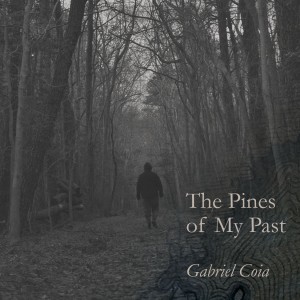Once upon a time in Europe, bards would be employed to document historical events and folklore through verse and music. It was a marriage of culture, history and entertainment. It is much in this same spirit that Gabriel Coia’s The Pines of My Past is presented to us. The Pine Barrens of southern New Jersey are an anomaly in many respects, both culturally and environmentally. It is a region with its own unique folklore and rich in historical significance. Gabriel Coia is no stranger to this culture; he is a part of it. As one listens to The Pines of My Past there is an immediate sense of authenticity. This music is not coming from outside observation of the pinelands; it is coming from within.
 The opening track, Devil’s Woods, recalls the Barrens’ most popular folklore – the Jersey Devil. Musically, this song features a haunting guitar motif and dark Celtic-inspired melodies that punctuate each verse and chorus. Lyrically, the skeptic is challenged and the Devil’s true lair is revealed. In true bardic fashion, the legend of Jerry Munyon, the wizard of the pines, is retold in “Where did Jerry Munyon Go?”, an up-tempo piece with an alternating bass and an American flavor. The colorful life of Joe Mulliner, the Tory outlaw, is captured in “Joe’s Last Jig“, another up-tempo sing-a-along that Joseph Mulliner himself might have enjoyed while living it up in one of the taverns that used to scatter the pines. “The Ageless River” is a bold undertaking that chronicles the history of the Mullica River – 20,0000 years in just a few minutes. Amazingly, none of the lyrics sound forced but rather flow smoothly like the river itself, and the dramatic accompaniment keeps our attention all the way through. Two songs in particular, “The Lady on the Dam” and “The Light Near Wells’ Mills Pond” depict old Pine Barrens lore previously hidden in oral tradition and fairly obscure print. The introduction of these tales is sure to stir the imagination as one ponders the supernatural qualities of the Pines. Ecological concerns are expressed in “Let the Barrens Burn” and more reflective and personal themes are presented in “The Girl from Hampton Gate” (which is set to a ¾ waltz), “The Lost Mill”, “Batsto Village” and “The Atsion Lock”.
The opening track, Devil’s Woods, recalls the Barrens’ most popular folklore – the Jersey Devil. Musically, this song features a haunting guitar motif and dark Celtic-inspired melodies that punctuate each verse and chorus. Lyrically, the skeptic is challenged and the Devil’s true lair is revealed. In true bardic fashion, the legend of Jerry Munyon, the wizard of the pines, is retold in “Where did Jerry Munyon Go?”, an up-tempo piece with an alternating bass and an American flavor. The colorful life of Joe Mulliner, the Tory outlaw, is captured in “Joe’s Last Jig“, another up-tempo sing-a-along that Joseph Mulliner himself might have enjoyed while living it up in one of the taverns that used to scatter the pines. “The Ageless River” is a bold undertaking that chronicles the history of the Mullica River – 20,0000 years in just a few minutes. Amazingly, none of the lyrics sound forced but rather flow smoothly like the river itself, and the dramatic accompaniment keeps our attention all the way through. Two songs in particular, “The Lady on the Dam” and “The Light Near Wells’ Mills Pond” depict old Pine Barrens lore previously hidden in oral tradition and fairly obscure print. The introduction of these tales is sure to stir the imagination as one ponders the supernatural qualities of the Pines. Ecological concerns are expressed in “Let the Barrens Burn” and more reflective and personal themes are presented in “The Girl from Hampton Gate” (which is set to a ¾ waltz), “The Lost Mill”, “Batsto Village” and “The Atsion Lock”.
Coia is a professional pianist but proves himself a talented multi-instrumentalist, lyricist, vocalist, arranger and composer as well. Musical instrumentation is extremely diverse with traditional folk instruments intertwined with large orchestral ensembles. Coia plays all of the instruments himself but also utilizes a synthesizer for some of the string arrangements as well as the percussion and wind instruments. Stylistically, Celtic and English folk are married with the polyphonic, large-scale instrumentation that is typical of theatrical scores. Some pieces lean more toward one approach over the other, but there is always a blending of the two. Coia realizes the potential of modern multi-tracking by using varied instruments to recall established melodies in refrains, providing diversity in timbre and ornamentation. Gabriel has clearly put a great deal of effort into this album with an impressive attention to detail. There are a number of different levels on which this album can be appreciated and enjoyed. Ultimately, it is the ever-present romanticism that extends to both lyrics and music equally that makes this album truly unique.
Jeff Larson
Author of Leeds Devil Blues and The Barrens
